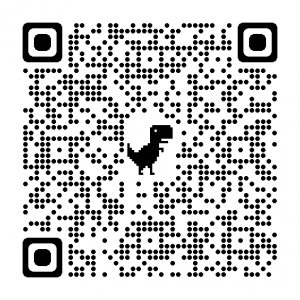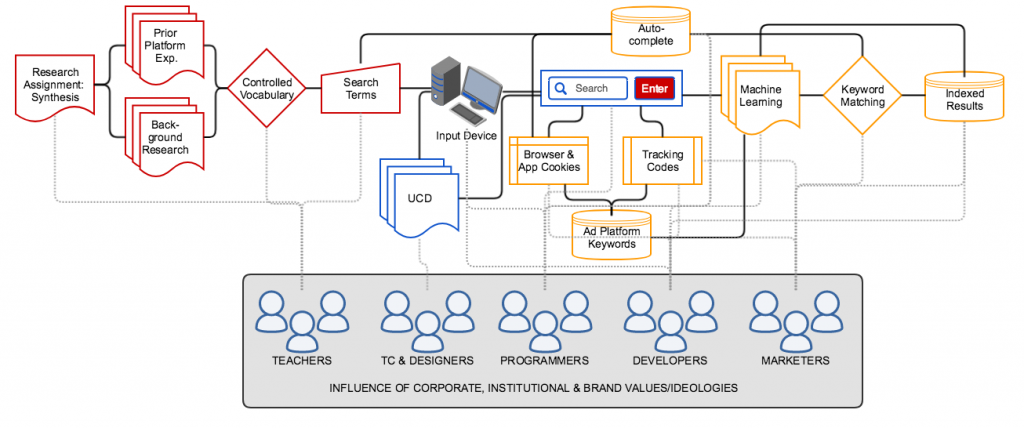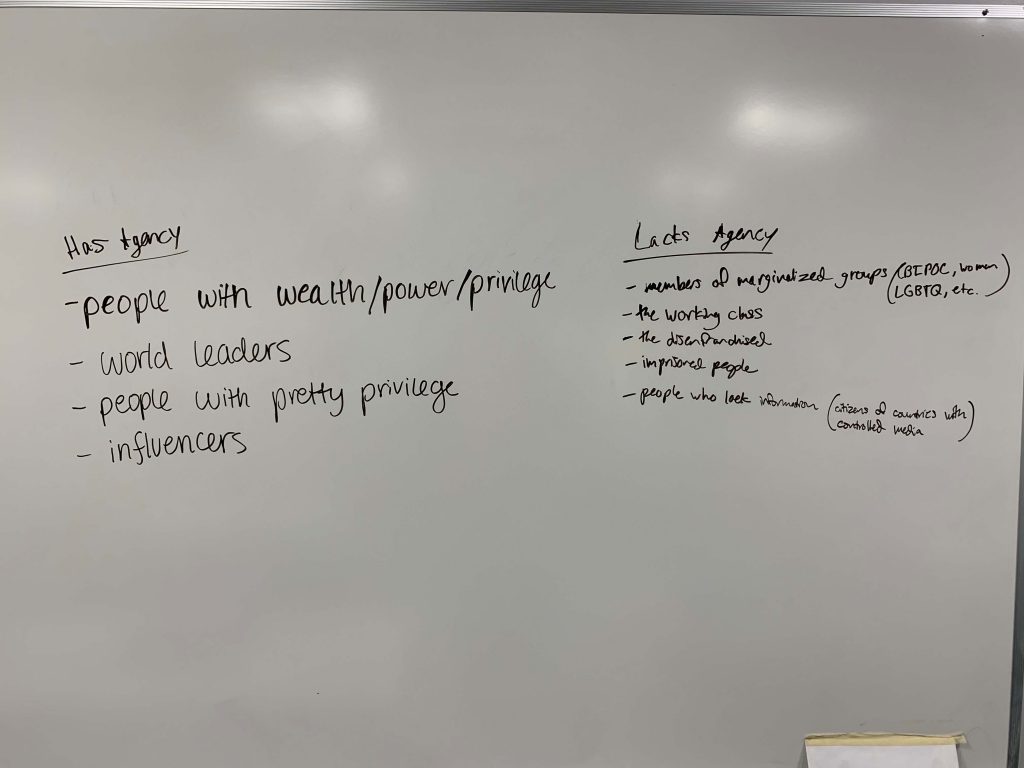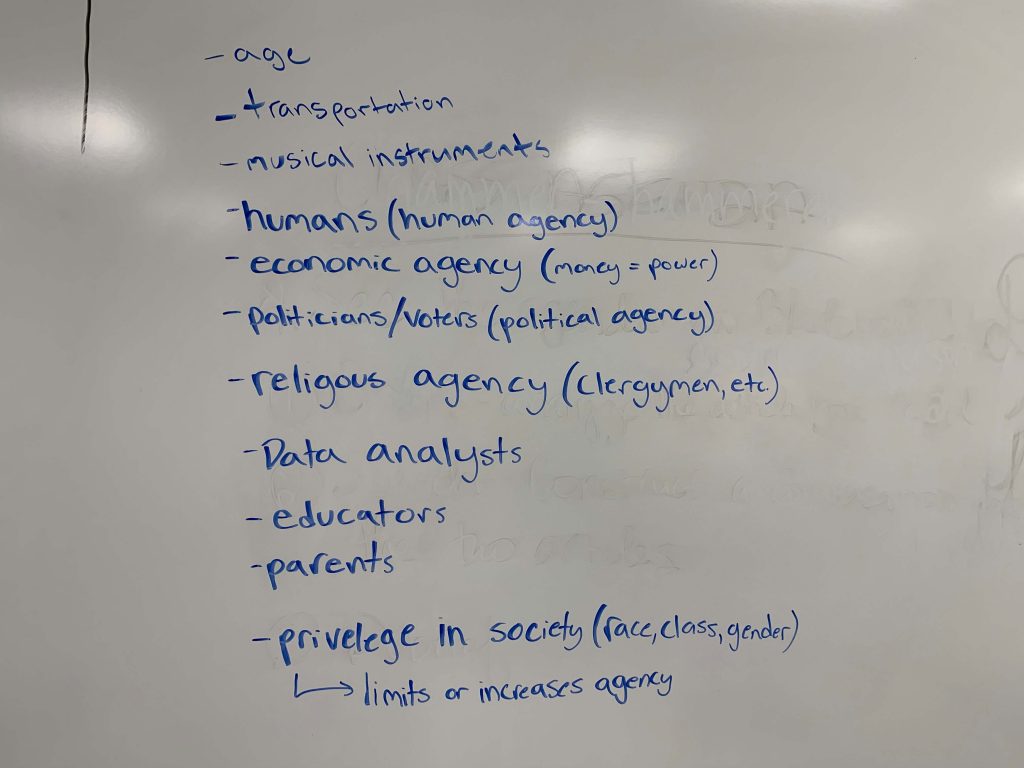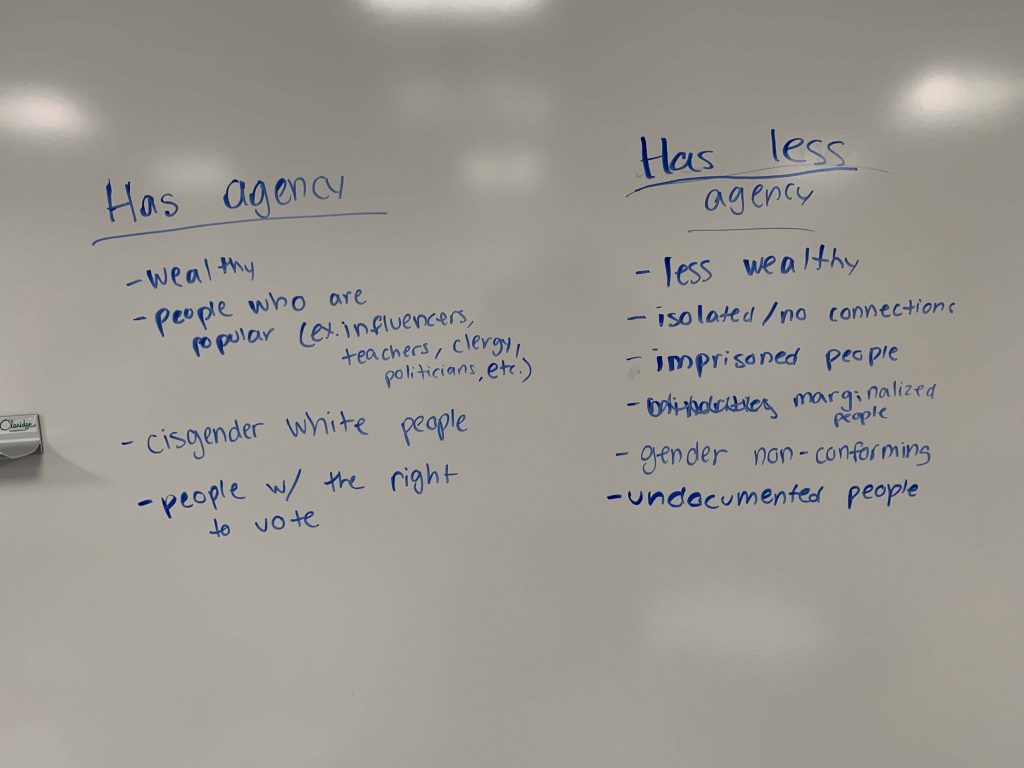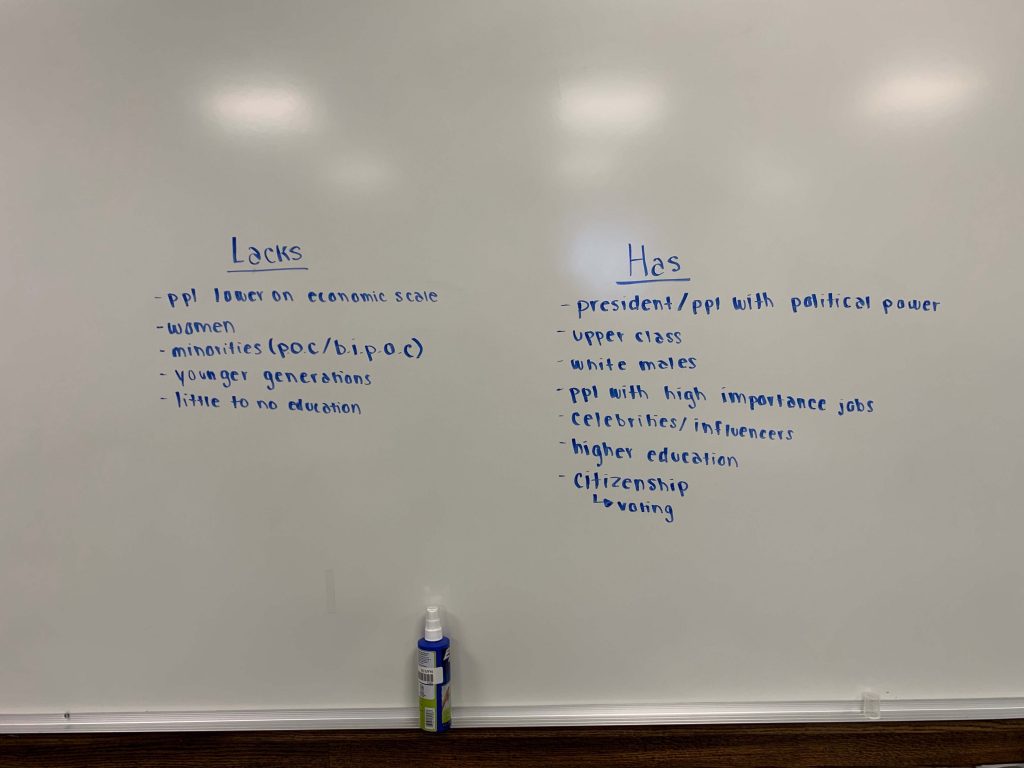I interpret agency as the way people get information from others. For example, when your phone or device is sitting in close proximity while talking about a certain item or topic, later that day ads relating to that topic appears. However, as we do not know for sure if our devices are listening to us speak, a single search can give insights into thoughts. An everyday example includes searches on Tik Tok. Whenever a search on Tik Tok goes through whether it be a person, hashtag, or song name, all this information goes into the system and puts more of each topic onto your content stream. As soon as the search button is hit, there are thousands of keywords that connect your information and store it for later use. I have experienced this when shopping online and then later going into Instagram and seeing ads for this particular brand or clothing item, making me want to go back and buy the item. This is a way to show the user more about what they like rather than what they dislike.
Agency- Bella Kjellen
Agency within our modern-day technological and media atmospheres revolves around the concept of connection between action and effect. Technology and platforms are reliant on human interaction to gain information which can then be allotted as future actions, thus it can seem like personal privacy is limited in this day and age. When I think about agency within technology, I first think of google searches. Autofilled search suggestions occur conveniently when needed due to the thousands of information pieces gathered with each search we plug in daily. Additionally, my dad works as a consultant for startups and has told me about the AI companies he works with- personal banking mostly mentioned. When thinking about artificial intelligence banking I have always thought this concept is slightly concerning. While yes, this is an incredibly efficient update within finances, I cannot help but wonder what else that information is used for. All actions through technology are used in some way or another, and I believe that while we as humans use these advancements to our benefit, our actions are also needed for the technology to run smoothly and to its benefit. By transferring our needs, income, and personal information into pieces of data, we are giving the technology insight into our wants, needs, and desires all of which will result in agency.
Keyword #9: Agency
In Media studies, agency refers to the level of human autonomy available in an increasingly technological world. As discussed in class, human and technological agency in a digital world is, in reality, conjoined. Meaning, the technology is reliant on human agency to make meaning while human agency is also manipulated by that meaning. According to a 2018 Pew Research study, there is a growing fear in the general public of losing jobs, knowledge, and control to AI. This fear has led to an increase in cybersecurity firms to prevent the use of weaponized information in AI for social or political gain. Bart Knijnenburg, assistant professor of computer science, combats this fear by reassuring that AI control will come down to intention. Although AI has the potential for serious ramifications against control, it is dependent on “how it’s implemented”. For example, Knijnenburg suggests that if algorithms and digital infrastructures can support and enhance decision-making processes, we will maintain agency. However, if developers continue this “filter-bubble” practice, we have less agency over the content we see.
References:
Anderson, J., & Rainie, L. (2019, December 31). 1. concerns about human agency, Evolution and Survival. Pew Research Center: Internet, Science & Tech. Retrieved November 3, 2021, from https://www.pewresearch.org/internet/2018/12/10/concerns-about-human-agency-evolution-and-survival/.
Mimi Bainbridge “Agency” Post
As described in our class discussion, on their own, both humans and technology don’t have enough autonomy to make meaningful change on her own. Agency is created through the action of humans and technology working together. For example, both groups are brought together once a statement is typed into google and the ENTER button is pushed. Agency can be found across a multitude of social media platforms and apps including Instagram, TikTok, and Apple Music. Based off certain actions that a user continues to take as they access the app, the technology will begin to offer up certain ads or posts that they believe will relate to the user in some way. Personally, I have experienced advertisements for particular clothing brands that I have either liked a post from or visited the website of before. Through my Apple Music account, I have also been offered certain song recommendations for my playlists or been shown a list of songs “Apple Music” feels as though I would enjoy.
Abby Bangs-Agency
I think that a coherent definition to what agency is, is ambiguous, as simply put, it can be the “dozens” of things that are happening after a simple action. An action could be searching something in google, following someone on a social media, etc.; agency can be anything that involves submitting an action towards the “gain” of something else. Whereas searching something goes through many process (infrastructure,) and within those processes, data is found and collected about the user, such as the user’s name, age, location, interests, etc. However, agency is not just one entity, it involves the individual pursuing the action, and the action that is being pursued. Within instagram, agency cannot exist without the user who is interacting with the app. Now, what happens when technology advances to where agency can occur without the individual? Then, technology will inherently exist outside hands of “man”. Agency is an important component of today’s technology, however as long as technology continues to advance, the individual will no longer be important to agency, as agency and technology will be able to concordantly exist without the individual. In movies like Wall-E, where technology has advanced so much to the point where humans are reliant over it, technology is seen to exist outside of human control. This advance makes technology almost like a drug, such that the existence of humans now lie in the control of technology, much like the existence of endangered animals lie in the control of humans today. Generally, agency is a fundamental part of technology, however it may be dangerous for agency to exist outside of human control.
Agency- Thomas Takele
Agency is very important in technology. The example that helped guide my understanding the most was the agency in a smart playlist. This example showed that as you specify the type of characteristics you want in your playlist, the playlist then acts as an agent and updates itself based on the songs that you listen to and adds the ones with the same characteristics in the playlist. This example made me think about the other ways in which technology has agency and the one that popped in my head is the feature on iPhones where it suggests apps that would be beneficial based on your location and the time of day. This, for example, would happen to me after I would always listen to music while walking home and my phone would then suggest the music apps that I would use to listen to music. This power of technology to track how people behave and make decisions based on that is a very interesting and new problem in the advancement off technology.
Agency- Lana Vjestica
Agency is a way of in a way spying on someone’s actions. As we talked about in our class discussion, a simple google search can figure out so much about you. We see this in many different ways when it comes to ads and social media apps. People often feel as though they’re being listened to because they’ll see ads about something they were talking about last week. As well as the Alexa’s and Google Homes, which are actually listening 24/7. It’s an interesting yet terrifying thing knowing that your actions are constantly being watched and recorded. Additionally to this, there are also things like travel agencies & employment agencies. A way to think about it is if you think about a travel agent and what they do. Their job is to collect information from other sources and offer you advice as to where you should go. This is very similar to a google search.
Week 11: November 2 & 4
What’s Due Next?
This Week
- Tuesday (today): Keyword Agency and ancillary reading Designing Agentive Technology: AI That Works for People
- Thursday: Response post to “Agency”
Near Future
- Be sure you’re able to access Apple TV+ (either through free trial or paid subscription) to watch Watch the Sound with Mark Ronson: Episode 1: Auto-Tune
What’s Coming Up?
- Continue thinking about how you’ll use ArcGIS StoryMap to visualize the definition of a keyword of your choice from KMS and/or our class coverage
Tuesday, November 2
Reflections on Short Response Paper #2: Technology
- Use this Google Form to reflect on the experience of writing this paper (use the QR code if you’d rather)
- Let’s discuss the results
- Any additional feedback on the assignment and the approach? How did you improve your work?
Thinking about Agency
Algorithms as Information Brokers: Visualizing Rhetorical Agency in Platform Activities (Hocutt 2019)
Designing Agentive Technology: AI That Works for People (Noessel 2017)
- What was news to you?
- What did you already know?
- What did you struggle to understand?
- What new insights did you identify?
- How might Agency be a useful approach to understanding All You Need is Kill and Edge of Tomorrow?
Visualizing Agency in a Digital Platform: Assemblage Agency
- When you write a paper, where does agency reside?
- How do you know?
- What does this tell you about the way we think about meaning-making activities and knowledge work?
Thursday, November 4
Consider the extent to which agency may be shared with animate and inanimate objects in this fight scene clip from First Strike (1996, directed by Stanley Tong).
- What are the actants (potential actors with agency)?
- What is the relationship among actors (actants that end up agentive)?
- Where do you see agency residing in various sequences from this fight scene?
Application in the World
One definition of agency, or at least rhetorical agency, is the ability to make meaning, and possibly change, in the world. As a result, agency has a relationship with power and its location.
If agency is making (meaning, difference, etc.), then who or what has and lacks agency in today’s social, economic, political, religious, and cultural climate? We’ll draw this up on the whiteboard.
What does this network of relations suggest about agency’s origins and practice?
- Who or what has agency?
- Who or what is left out of agency?
- What is the relationship of agency to media? To culture? To identity?
- How do media address or handle agency?
- How does culture address or handle agency?
- How does identity tie into agency, especially in the information economy?
Alvin- Infrastructure
According to the keyword essay, Infrastructure is a mode of organization for a complex system. It is the intangible behind the scenes connections that hold together an orderly structure. The amalgamation of infrastructure and media is very interesting because for a very long time, infrastructure has been linked to the physical element and not the details that make these objects usable and manageable. An example is the social media infrastructure comprising the users and the application but also the complex algorithms used to develop and maintain it. Although usually associated with technologies, I think Infrastructure in society can be observed at the core foundation of a well established system in a given community. An example can be in the education sector . Institutionalised Education is not merely a single element but rather a mixture of components that make it exist. Thinking about the University of Richmond, I would say that the infrastructure does of course include current students and staff as the primary constituent but the infrastructure expands to the alumni, campus structures, shareholders, study abroad programs, clubs and a variety of other components that complete the puzzle.
Infrastructure – Chloe Fandetti
Infrastructure was defined in the early twentieth century as “a collective term for the subordinate parts of an undertaking; substructure, foundation” (106). Over the years, as the world has evolved, this definition has expanded to encompass various technological and industrial advancements including power grids, subways, freeways, sewer systems, pipelines, and more. Author Lisa Parks emphasizes the importance of the relationship between media infrastructures and affective labor; Media infrastructures rely on affective labor to sustain themselves. For example, the amount of people who use landlines has dramatically decreased over the past decade. This decrease is not because there is a technical or functional issue with landlines, but rather, people do not have enough attention, time, or money to use both their landlines and their mobile phones. New media and new technologies are constantly emerging, taking people’s attention away from older ones. Whereas our society used to only have one telecommunication structure (telegraphy), it now has multiple systems (telephony, radio, cable, internet, satellite) that all have to cooperate and compete with each other for user’s attention. Despite capitalism operating as if human time and energy are boundless, humans do not have the capacity to sustain all of the existing and emerging infrastructures. Although, increasing internet access in more underdeveloped countries would be one way to expand digital capitalism’s human resources.

